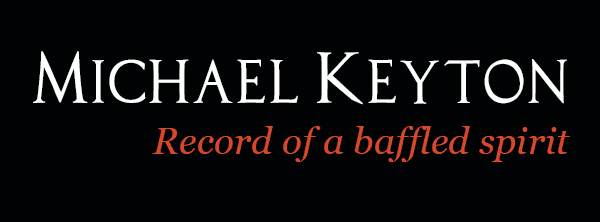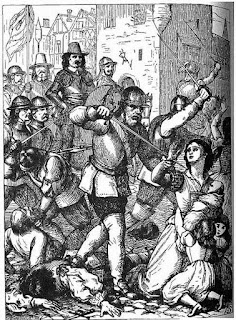Some people wonder
about the meaning of life. With me it's death and whether half of those punks
I've consigned to the other side will be waiting for me when it's my turn to
choose a coffin and shroud. I glanced across the room at where Sheri was
sitting, and grinned. She'd have chosen hers already and nail-paint to match.
There'd be others beyond the veil waiting for her too, but she wouldn't be
thinking about them. She'd be wondering which saint to seduce first, assuming
things went to plan and she didn't end up some place hotter. Old Nick would
have one helluva surprise.
"Clay?"
Jeez, she was
reading my mind...but no.
"Mac is
waiting," she said.
"Mac?"
"-6 Ways to Mental, Mac."
"Jeez, You've
brought me a fruit-cake?"
"His
book, Clay. 6 Ways to Mental." She
planted a kiss on my jaw and knocked me to Heaven. If I wanted more I was gonna
have to talk to a guy about a book.
What is your latest book about?
‘6 Ways to Mental’
continues a year after ‘6 Ways to Die.’ Margarite Abernathy copes with PTSD
from the brutality she lived fighting terrorists working to unleash a worldwide
plague. Outbreaks continue to flare, and her brother quietly battles the
terrorists behind them, drawing Mar into the horror again.
You are highly prolific. Is there an optimum number of
books published before you begin to make money.
I’ll tell you when
I reach that point *smile*
Which two pieces of advice would you give to a new
'Indie' writer?
Two bits wouldn’t
help. There is so much to learn, the craft so demanding, the competition and
obstacles overwhelming. It is like a neuro surgeon only taking ‘the important’
classes in medical school.
Which fictional character would you like to have a
close relationship with?
My seemingly
autistic character (you have to read and decide for yourself if he isn’t just
weird) Augie in my SEEker series would be cool to hang with.
Which four literary characters would you like to
invite to dinner, and why?
I watch the news
during dinner, so would rather go out for wings and beer for lunch. My
character Carter from my werewolf series would be entertaining, as would Toni
from my SF series. I think ogres Morgan and Ike from my Black Lake
series would round out the table well.
What are you currently reading?
I’ve just started
a dystopian I may not finish by Erica Stevens, ‘The Survivor Chronicles’
Which four books do you wish you had written?
Anything by Anne
McCaffrey (the earlier books she wrote herself).
Are you ever afraid that one day you will stop
enjoying writing?
I got over that
about ten years ago.
Every writer has a weakness, what is yours?
I like to snack
too much when I’m editing.
Which author makes you jealous and why?
Any author who is
making a living with their writing.
To agent or not to agent? Why or why not?
All the indies who
are surviving on their writing first got recognized traditionally, or sold
enough to get picked up traditionally (e.g. Wool), so there must be a lesson
there.
Has a book ever made you angry. If so, which one?
I read mostly
indie titles to support ‘my kind.’ I delete about nine for every one I finish.
There are too many self-published books that never should have been published,
by authors who don’t know the craft, don’t know the basics of formatting. THAT
makes me angry. They are making all of us look like weenies.
Is self publishing the new 'slush-pile’?
I don’t think so.
The only titles the traditional publishing components (agents, publishers) look
at, hit big sales before they ever look at them, so they let the market (and
the author’s marketing skills) drive what they consider. They certainly don’t
have to dredge the ‘slush-pile.’
Elmore Leonard listed ten rules, one of which is: 'Try
to leave out the part that readers tend to skip. Think of what you skip reading
a novel.' What rule or piece of advice would you add to the list, and if you
know his ten rules, which one would you happily see broken?
I think all of
Elmore’s rules are common sense, if not literal. Rule one, don’t start with the
weather. Well, if it is pertinent, the protag is in a sinking boat in the
middle of a hurricane, what else would you start out with? The point is…write
about what is most important in sequence, to tell the story so that you never
drop the reader’s attention or piss her off. All ten rules reflect that goal.
I read the blurb
as Sheri saw to R. Mac Wheeler's more intimate needs, putting his coat on, her hand
lingering on his shoulder longer than it goddamned should: Nightmares. Panic attacks. Depression. Margarite is hammered by the
typical issues of a seventeen year old loner, whose parents sympathized with
insane people intending to collapse civilization. Jeez, the dame had problems.
The few who care about Mar have more
concerns. Her drinking. Fighting. Jumping out of airplanes. Heh, heh, heh, that's better, though her brother sounds more than a jerk. I gave Sheri a look. The book sounded good but my jaw was still tingling, and Sheri had promised me more.




























